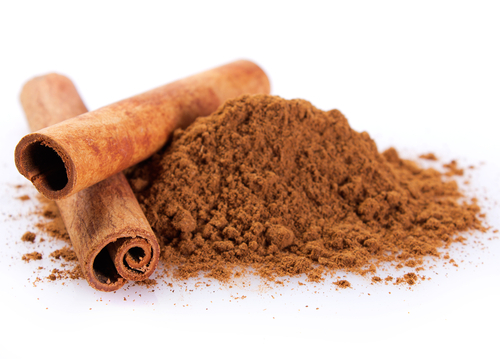Short answer
Cinnamon is not bad for you unless consumed in extreme excess. In moderation, cinnamon can have many positive effects on your health.
Recommended Alternative
Very healthy and numerous health benefits. Harmful qualities may be associated, but aren't usually serious.
View Full Grading System
Category 'A'
Very healthy and numerous health benefits. Side effects are rare. Things rated an 'A+' are typically necessary for survival (for example, water).
Very healthy and numerous health benefits. A few harmful qualities may be associated, but only under certain circumstances such as an allergic reaction.
Very healthy and numerous health benefits. Harmful qualities may be associated, but aren't usually serious.
It is important to note that even the best things in life can become bad in immoderate amounts. So, although something may be rated an 'A+', overconsumption/overdoing can bring unwanted effects.
Category 'B'
Very beneficial to your health. Things rated a 'B+' may have a few harmful qualities to pay attention to.
Overall beneficial to your health. Things rated a 'B' may have some harmful qualities to pay attention to.
More beneficial to your health than not. However, harmful qualities are most likely associated and shouldn't be overlooked.
The main difference between category 'A' and category 'B' is the harmful qualities typically present in 'B' items. Serious side effects are usually uncommon, but are still possible and should be taken note of.
Category 'C'
Both beneficial and harmful qualities associated. Things rated a 'C+' are typically a bit more on the beneficial side. Still, moderation is important.
A fairly even ratio of beneficial and harmful qualities. Moderation is important. Very general topics that can lean towards both sides of the spectrum will be placed here as well. Rice, for example, can be good or bad depending on the type.
More harmful than beneficial. Side effects are common, especially when consumed/done excessively. Moderation is very important.
Category 'C' usually denotes to both good and bad qualities. When it comes to this category, it is important to keep this word in mind: moderation.
Category 'D'
Harmful to your health. Although benefits may be associated, the bad most likely outweighs the good. Moderation is very important.
Harmful to your health. A few benefits may be associated, but the bad outweighs the good. Moderation is extremely important.
Harmful to your health. Very few, if any, benefits are present. Things in this category should be avoided as much as possible.
Category 'D' is typically for things that are more harmful than beneficial. While consuming/doing something unhealthy once in a blue moon shouldn't hurt, we definitely recommend eliminating 'D' items as a regular part of your routine/diet.
Category 'F'
Category 'F' is for things that fail to bring anything beneficial to the table, and are very harmful to your health. We recommend completely avoiding anything in this category. Long-term side effects of 'F' items are usually very serious.
Category 'N'
'N' stands for neutral. Things placed into this category are generally (a) neither good nor bad for you, or (b) lack the necessary evidence to reach any conclusions.
Long answer
Cinnamon is a spice which is ground from the inner barks of trees in the Cinnamomum genus. It is commonly used to flavor many foods and recipes, including muffins, toast, and coffee drinks.
Cinnamon is generally considered a healthy spice. Its main ingredients include flavonoids and cinnamaldehyde, each of which are tied to their own health benefits. Flavonoids function as antioxidants after consumption and can help prevent and repair damage to the cells in your body, as well as prevent harmful diseases such as cancer. Cinnamaldehyde, another major ingredient in cinnamon, acts as an anti-inflammatory, anti-bacterial, and anti-viral substance.
While the health effects of cinnamon are primarily positive, excess consumption can lead to some adverse effects as well. For example, consuming too much cinnamon can cause painful irritation to the tissues on the inside of your mouth. Furthermore, excessive amounts of coumarin, which is a primary ingredient found in cinnamon, can damage the ability of your blood to clot sufficiently, as well as contribute to the development of liver disease.
Generally speaking, cinnamon is not bad for you unless consumed in extreme excess. Using cinnamon regularly to flavor certain foods or drinks you consume or taking a small cinnamon supplement can actually be beneficial to your health rather than harmful.
Possible short-term side effects
Possible long-term side effects
- decreased ability to clot blood
-
liver disease (when consumed excessively)
Ingredients to be aware of
Benefits
- anti-inflammatory properties
-
anti-viral properties
-
anti-bacterial properties
-
repair of damaged cells
-
prevention of damaged cells
-
reduced risk of cancer
Our Wellness Pick
(what is this?)
Organic Ceylon Cinnamon
- Authentic Ceylon variety
- Organic cinnamon powder
- Non-GMO project verified
- Rich in antioxidants
- Aromatic flavor enhancer
Learn More!
Please turn your Ad Blocker off to see this content. Thank you!
Thank you for your feedback!
Written by Shaylie F
Published on: 12-29-2015
Last updated: 12-15-2023
Thank you for your feedback!
Written by Shaylie F
Published on: 12-29-2015
Last updated: 12-15-2023

 Approved by
Approved by 















